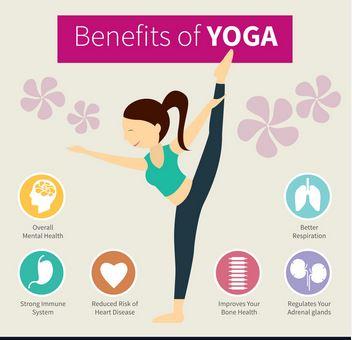In today’s fast-paced world, where stress and anxiety often seem to reign supreme, finding effective and holistic ways to maintain our physical and mental well-being is more important than ever. Among the myriad of wellness practices available, yoga stands out as a powerful and transformative discipline. Rooted in ancient traditions, this practice offers far more than just physical postures and stretches. Regular yoga not only enhances flexibility and strength, but it also promotes mental clarity, emotional stability, and an overall sense of harmony within oneself. In this article, we will delve into the profound health benefits of a consistent yoga practice, exploring how it can serve as a vital tool in enhancing both physical health and emotional resilience. Whether you’re a seasoned yogi or a curious beginner, understanding the extensive advantages of yoga might just inspire you to roll out your mat and embrace a healthier lifestyle.
Table of Contents
- Understanding the Physical Benefits of Yoga for Overall Health
- Enhancing Mental Well-Being Through Mindfulness and Movement
- Building Strength and Flexibility: Yoga as a Comprehensive Fitness Solution
- Incorporating Yoga Into Your Daily Routine for Maximum Benefits
- Concluding Remarks
Understanding the Physical Benefits of Yoga for Overall Health

Yoga is a holistic practice that transcends mere physical movement, showcasing a spectrum of benefits that profoundly enhance overall health. Engaging in regular yoga not only improves flexibility and strength but also plays a crucial role in enhancing cardiovascular health. Scientific studies have shown that consistent yoga practice can lead to lower blood pressure, improved circulation, and a more efficient heart rate. Some key physical benefits include:
- Improved Flexibility: Increases range of motion and helps prevent injuries.
- Enhanced Strength: Builds muscle tone and stability in various postures.
- Better Posture: Encourages alignment, reducing strain on the spine.
- Boosted Immunity: Helps in reducing stress hormones, positively impacting immune function.
Moreover, yoga’s emphasis on breath control, known as pranayama, facilitates better lung capacity and enhances respiratory function. This deepened breath awareness can lead to improved oxygenation of the body, thus optimizing physical performance in daily activities. Research indicates that individuals who practice yoga regularly experience less muscle tension and improved recovery times post-exercise. Below is a table summarizing the remarkable ways in which yoga supports physical health:
| Benefit | Description |
|---|---|
| Flexibility | Enhances range of motion in joints, reducing stiffness. |
| Balance | Improves coordination, reducing fall risk. |
| Strength | Promotes muscle tone across various body parts. |
| Postural Alignment | Encourages proper alignment, decreasing back pain. |
Enhancing Mental Well-Being Through Mindfulness and Movement

Mindfulness, when paired with physical movement, creates a potent synergy that cultivates emotional resilience and promotes mental clarity. Engaging in yoga not only fosters physical strength but also emphasizes the importance of being present in the moment. This practice encourages practitioners to focus on their breath and body, thereby reducing stress and anxiety levels. The rhythmic flow of poses enhances relaxation and can lead to significant improvements in mood. Some of the mental health benefits associated with regular yoga practice include:
- Decreased anxiety: Mindful breathing techniques can lower stress hormones.
- Improved focus: Enhances cognitive functions through meditation.
- Emotional regulation: Increases awareness of thoughts and feelings.
- Enhanced self-compassion: Fosters a positive relationship with oneself.
Movement in yoga is intentional, promoting somatic awareness that reconnects the mind and body. As practitioners flow through various poses, they learn to listen to their bodies, recognizing the subtle signals that indicate tension or discomfort. This deep connection not only provides a safe space for emotional release but also encourages growth and personal insight. To better understand the influence of yoga on mental well-being, consider the following comparisons:
| Yoga Practice | Mental Health Benefit |
|---|---|
| Hatha Yoga | Enhanced relaxation response |
| Vinyasa Yoga | Increased energy and focus |
| Restorative Yoga | Deep emotional release |
| Meditation | Improved emotional resilience |
Building Strength and Flexibility: Yoga as a Comprehensive Fitness Solution
Yoga is remarkably effective at enhancing both strength and flexibility, making it an ideal practice for individuals seeking a comprehensive approach to fitness. The various poses, or asanas, engage multiple muscle groups, promoting muscle tone while improving endurance. Through consistent practice, participants may experience increased muscle strength in key areas such as the core, legs, and upper body. Moreover, the dynamic nature of yoga flows allows for functional strength development, which is crucial for everyday activities. This multidimensional fitness approach means that practitioners are not only building physical prowess but also cultivating balance and stability.
Flexibility is another significant benefit of yoga, which plays a pivotal role in overall physical health. Regular stretching through yoga poses helps to lengthen the muscles and increase range of motion, often leading to enhanced athletic performance and reduced injury risk. Moreover, the emphasis on breathing in yoga practice aids in relaxing the mind and body, allowing for deeper stretching and recovery. To illustrate the connection between strength and flexibility gained from yoga, consider the following table:
| Benefit | Yoga’s Impact |
|---|---|
| Muscle Tone | Engages various muscle groups for strength building |
| Balance | Improves stability and core strength |
| Flexibility | Increases range of motion and reduces tension |
| Injury Prevention | Strengthens muscles while enhancing flexibility |
Incorporating Yoga Into Your Daily Routine for Maximum Benefits
Integrating yoga into your daily life doesn’t have to be a daunting task. Start by setting realistic goals that fit your schedule and personal commitments. Even dedicating a mere 10-15 minutes each day can lead to significant improvements in both mental and physical health. Begin your day with simple stretches or a short flow to awaken your body and mind. Consider incorporating yoga sessions during your lunch break or before bedtime to create a brief oasis of calm and restore balance. The key is to find those moments that work best for you, ensuring that yoga becomes a cherished part of your routine rather than another obligation.
Establish a consistent practice by utilizing tools that remind you to stay on track. Create a calming environment—whether it’s at home, in a park, or at a studio—where you can engage with your mat and yourself fully. To enhance your practice, you might also explore the following options:
- Yoga Apps: Many apps provide guided sessions ranging from beginner to advanced levels.
- Join Classes: Seek local or online classes to connect with a community and stay motivated.
- Daily Challenges: Participate in 30-day challenges to encourage consistency and push your limits.
As you delve deeper into your practice, monitor your progress and the benefits you’re experiencing. Keep a journal to document your physical improvements and emotional insights. This reflective practice can reveal how yoga is transforming your life, fostering a greater understanding of your body and mind, and ultimately leading to a more fulfilling experience.
Concluding Remarks
As we conclude our exploration of the profound health benefits of regular yoga practice, it’s clear that this ancient discipline offers much more than just physical exercise. From enhancing mental clarity to promoting emotional well-being, the holistic advantages of yoga are both compelling and transformative. Whether you’re seeking to alleviate stress, improve flexibility, or cultivate a deeper connection with yourself, the practice of yoga provides a supportive avenue to achieve these goals.
Incorporating yoga into your daily routine can unlock a pathway to greater self-awareness and resilience, enriching your life on multiple levels. Remember, the journey with yoga is a personal one—start where you are, listen to your body, and allow this practice to unfold in its own time. As you embark on, or continue, your yoga journey, may you find not only improved health but also a newfound sense of peace and balance that permeates every aspect of your life. So roll out your mat, breathe deeply, and embrace the countless benefits that await you on this transformative journey.



